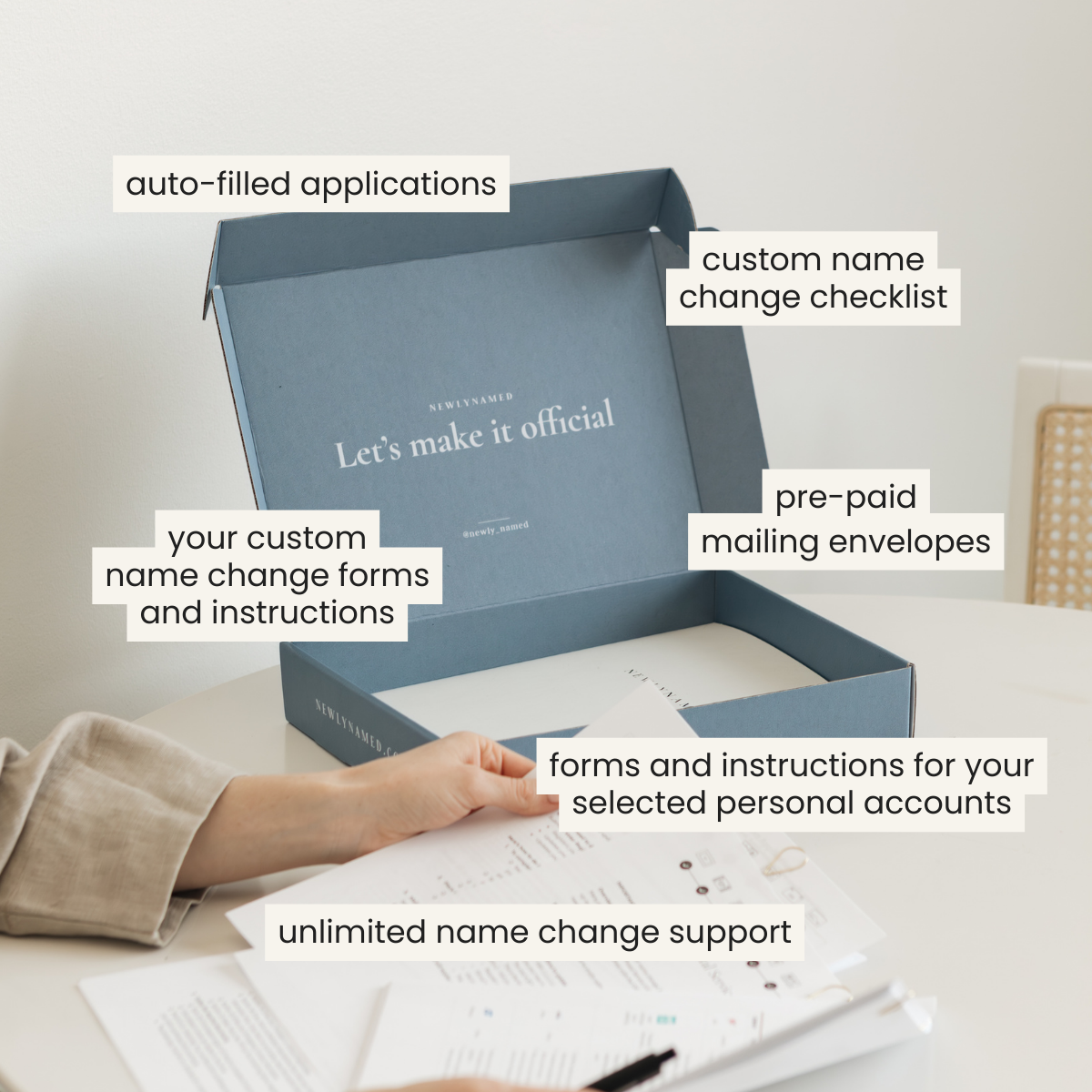Name Change New Hampshire
In this article, we’ll break down the steps of changing your name in New Hampshire, spotlighting how our comprehensive kits can save you hours of research and stress, and ensure you’ve got everything you need to cross the finish line.
Who Is Eligible For A Name Change?
If you’re in New Hampshire and considering a name change, the good news is that the state doesn’t throw up impossible barriers for a name change, but there are rules to follow. Generally, eligibility hinges on a few key life events or legal circumstances, including:
- Marriage and Divorce: If you’ve recently tied the knot or untied it through divorce, you’re almost certainly in the clear to request a name change. Marriage and divorce certificates provide the legal backing needed to update your identity across various records.
- Court Orders: Beyond that, court orders open the door for a broader range of situations. Maybe you’re seeking a fresh start, aligning your name with your cultural heritage, or correcting a clerical error from way back when. As long as you’ve got a court order in hand—obtained through a petition process in a New Hampshire probate court—you’re eligible to make the switch.
- Those Of A Certain Age: Age isn’t a dealbreaker either; minors can have their names changed with parental consent or guardianship approval, often tied to adoption or other family restructuring.
- Residency Considerations: New Hampshire doesn’t impose strict residency requirements for name changes tied to marriage or divorce, so even if you’re a non-U.S. citizen living in the state, you can still navigate this process with the right documentation. For other reasons, though, you’ll need to show ties to the state when filing a petition.
How To File A Name Change Petition
Step 1: Head To Your Local Probate Court
First, you’ll need to head to your local Probate Court. In New Hampshire, name changes are handled at the county level, so find the court that serves your area. You’re looking for a “Petition for Change of Name” form, which is usually available online through the New Hampshire Judicial Branch website or in person at the courthouse. Fill this out with the basics—your current name, the new name you want, and a brief reason for the change (marriage, divorce, or just a personal choice).
Step 2: Pay A Filing Fee
Next up, you’ve got to pay a filing fee. As of the latest info, it’s around $110, but check with your specific court because these things can shift quickly. Submit your petition along with any required ID (like a birth certificate or driver’s license) to prove you are who you say you are.
Step 3: Undergo A Background Check
Now, here’s where it gets a tad tricky, but still totally doable. Depending on your situation, the court might require a background check, especially if there’s any hint of fraud or identity concerns.
Step 4: Publish A Name Change In A Local Newspaper
A notice of your name change might be published in a local newspaper unless you request an exemption for privacy or safety reasons. If there are no objections after a short waiting period, the judge will likely approve your request.

Required Documents For A Name Change
Let’s break down the essentials you’ll need to gather before you head to the courthouse or start filling out forms:
Proof Of Identity
First up, you’ll need proof of identity. This includes a current driver’s license, state ID, or passport, to prove that you are who you say you are.
Reason For Name Change
If the reason for changing your name is due to marriage, bring your marriage certificate. For divorce, have your divorce decree ready, ideally with the section that restores your previous name highlighted. If you’re changing your name via court order for personal reasons, you’ll need to file a petition with the court, and they’ll expect some backstory—think of it as your character’s origin tale.
Proof Of Residency
You’ll also need to prove residency in New Hampshire. Utility bills, a lease agreement, or voter registration with your current address will do the trick. Some counties might ask for additional items, like a birth certificate or even a criminal background check, especially if the name change isn’t tied to marriage or divorce.
Tips For Compiling Your Documents
One pro tip: make sure all your documents are certified copies where required. And double-check the specifics with your local probate court, as requirements can vary slightly depending on the county.
Updating Your Social Security Records
In order to update your Social Security records, adhere to the following:
- Fill Out Your SS-5 Form: First, you’ll need to fill out the SS-5 form, which is the official application for a new Social Security card. You can grab this form online or at your local Social Security office. Make sure you’ve got the necessary documents to prove your identity and the legal basis for your name change—think marriage certificate, divorce decree, or court order. If you’re a non-U.S. citizen living in the States, you’ll also need to show proof of your legal status, like a visa or green card.
- Submit Your Paperwork: Once you’ve got your paperwork together, you can submit it in person at a Social Security office or, in many cases, by mail. Double-check the specific requirements for New Hampshire on the Social Security Administration’s website, as processing times can vary. Expect to wait about 10-14 business days for your new card to arrive, though it’s wise to follow up if you don’t hear back within that window. Pro tip: don’t delay this step. Your Social Security number is tied to so much of your life—taxes, employment, you name it—that getting this updated ASAP saves you a heap of headaches down the line.
Changing Your Name On Your Driver's License And Vehicle Title
The key here to changing your name on your driver’s license and vehicle title is preparation. Make a checklist, triple-check it, and maybe bring a good podcast for the inevitable wait. Here’s what you should know in the process:
- Head To The DMV: First up, the driver’s license. In New Hampshire, you’ll need to head to a Division of Motor Vehicles (DMV) office in person—there’s no online shortcut for this one. Before you go, gather your proof of name change (think marriage certificate, divorce decree, or court order), your current license, and a document proving your residency, like a utility bill. You’ll also need to show proof of identity, such as a Social Security card or passport.
- Paying The Fee: The fee for a new license isn’t steep, usually around $50, but double-check the latest costs on the DMV website to avoid surprises. Once you’ve got everything, expect to fill out a form on-site, snap a new photo (smile!), and walk away with a temporary paper license until the real one arrives in the mail.
- Updating Your Vehicle Title And Registration: Now, onto your vehicle title and registration. If your car’s title still reflects your old name, you’ll need to update it to match your shiny new license. This process also starts at the DMV, and you’ll need similar documents—proof of name change, current title, and registration. There’s a small fee for issuing a new title, typically under $30, but it’s a small price for peace of mind. If your vehicle is financed, you might need to loop in your lender to sign off on the change, which can add a layer of hassle. Pro tip: call ahead to confirm the exact paperwork and avoid multiple trips. Once the title’s updated, your registration should follow suit, often with a quick sticker or form update.
Handling Professional Licenses And Certifications
Whether you’re a nurse, a lawyer, a real estate agent, or any other licensed professional in New Hampshire, your credentials are tied to your identity, and failing to update them can lead to headaches like delayed renewals or even legal hiccups. Here’s a breakdown of what you should look out for when handling professional updates:
Different Rules For Different Professions
Firstly, understand that each profession and licensing board has its own rules. Some might require a simple form and a copy of your marriage certificate, divorce decree, or court order, while others could demand a full reapplication process. Start by contacting your specific licensing body—whether it’s the New Hampshire Board of Nursing or the Office of Professional Licensure and Certification—and ask for their name change policy. Most of these agencies have websites with downloadable forms or FAQs, so you won’t need to spend hours on hold listening to elevator music.
Timing Matters
Next, timing is everything. Don’t let your license lapse while you’re sorting out the paperwork. If your renewal is coming up, tackle the name change first to avoid discrepancies that could flag your account.
Think About Industry-Specific Credentials Or Memberships
Finally, don’t forget about certifications that aren’t state-regulated but still matter for your career. Think industry-specific credentials or memberships tied to your name. Reach out to those organizations directly, and make sure your updated name matches across all platforms. It’s tedious, yes, but it’s the kind of detail that keeps your professional life running smoothly while you’re already juggling the chaos of a personal transition. Stick with it—you’ve got this.
Read also:
What are the legal grounds for changing my name in New Hampshire?
Hey there, if you’re looking to change your name in New Hampshire, you’ll be glad to know the state allows it for a variety of reasons. The most common grounds include marriage, divorce, or simply a personal decision to adopt a new identity through a court order. As long as your request isn’t for fraudulent purposes or to evade legal obligations, the courts are generally supportive.
How can I change my name after marriage in New Hampshire?
Getting married and taking on a new name? Congrats! In New Hampshire, you can start using your spouse’s last name right after the wedding by updating key documents like your Social Security card and driver’s license. You’ll need your marriage certificate as proof, and the process is pretty painless if you’ve got the right forms.
Do I need a court order to change my name in New Hampshire?
Not always! If you’re changing your name due to marriage or divorce, you typically don’t need a court order—just the relevant documentation like a marriage certificate or divorce decree. However, if you’re changing your name for other reasons (say, a personal choice), you’ll need to petition the Probate Court in your county. It involves filing a form, paying a fee, and sometimes attending a hearing.
How long does the name change process take in New Hampshire?
Let’s be real: the timeline depends on a few factors, like whether you’re going through a court order or just updating records after marriage or divorce. For non-court changes, updating key documents like your Social Security card or driver’s license can take a few weeks, assuming everything’s filed correctly. Court-ordered changes might stretch to a couple of months with filing and hearing schedules.
How do I change my name on my New Hampshire driver’s license?
Updating your driver’s license in New Hampshire is a key step after a name change, and it’s not as daunting as it sounds. You’ll need to visit a DMV office with proof of your name change (like a marriage certificate or court order) and fill out the necessary forms. There’s a small fee, and you might need to provide additional ID.
How can I change my name on my Social Security card in New Hampshire?
Updating your Social Security card is often the first domino to fall in a name change, and it’s crucial for everything else to line up. In New Hampshire, you’ll need to submit an application to the Social Security Administration with proof of your name change—think marriage certificate, divorce decree, or court order. You can do this by mail or in person at a local office. The process is free, but it’s easy to trip over the details.







